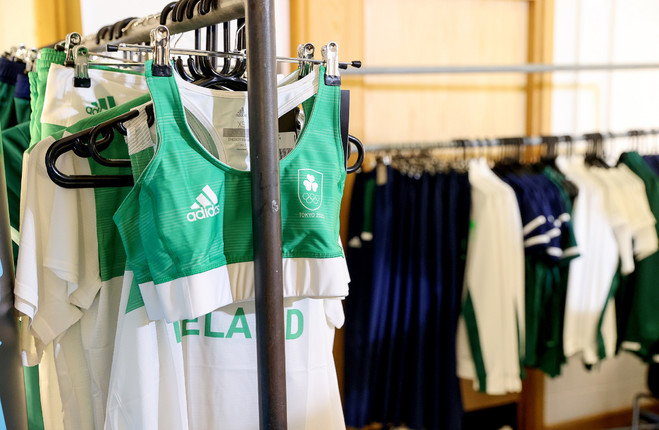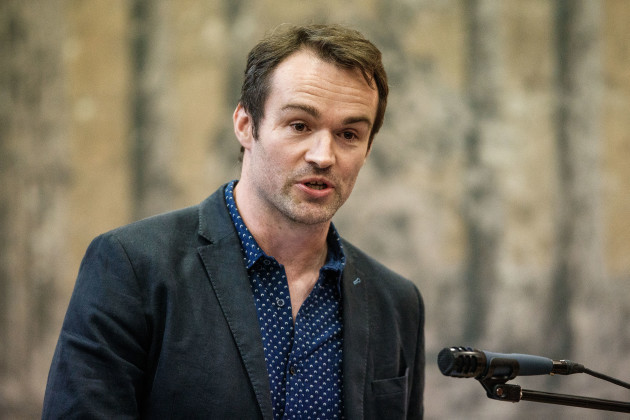OLYMPIC FEDERATION OF Ireland (OFI) chief medical officer Dr Jim O’Donovan says he expects over 90% of Ireland’s traveling party for this summer’s Games to be vaccinated before they depart for Tokyo.
The vaccine will not be mandatory for Team Ireland, however, with O’Donovan acknowledging that a small minority of athletes may not wish to receive it for personal reasons or even due to competitive concerns, the latter factor exacerbated by the vaccine becoming available only during such a key juncture in their final preparations.
The OFI’s CMO also stressed that he would have been reluctant to travel to Tokyo for the Games had it not been for the deal struck between the International Olympic Committee (IOC) and Pfizer which ensured that the vaccine would be made available for all parties involved in competition this summer.
Speaking at an Olympic media day, O’Donovan said: “For me, it’s great to be involved in any Olympic Games but this Olympic Games has created unbelievable challenges from a medical point of view.
“Up until the point that we were able to access vaccines, I would have been very hesitant about travelling with the team. But we were able to secure those, thankfully, through the IOC.
“Obviously, they helped, then, getting those out to everybody, so we’ve got a pretty-much fully vaccinated team traveling over which gives me a lot of reassurance.”
Dr O’Donovan added that “every Irish athlete will have been offered the vaccine” before they leave for Tokyo, but added that he was “not sure every Irish athlete — maybe for personal reasons — will have taken it.
“Definitely, I would think we’re over 90% vaccinated,” he said. “The challenge, to be honest, was the logistics because we got access to vaccines quite late. We were in the middle of qualifying and travel, and people weren’t in Ireland. So, it was more a logistical issue.
“Apart from that, there was very little resistance.
We did a vaccination education programme where we gave recommendations on when people could train afterwards, what potential side effects they may encounter. And with the Pfizer vaccine (the one made available to Tokyo athletes), we knew that the second dose was a higher-risk-of-side-effect profile; anything up to 70, 80% of people will have some form of side effect in the first few days, so it was acknowledging that there was going to be some side effects.
“Maybe one or two, I spoke to individually just to allay any fears, but I’m pretty much happy with our take-up for the vaccination programme.
“We could be hitting 95%, hopefully 100%”, O’Donovan stressed, “but we’ve had a remarkable take-up compared to some of the other countries.
If you compare it to some of my colleagues in North America where there’s quite high levels of vaccine hesitancy for political reasons, et cetera — we haven’t encountered that.
O’Donovan said that reasons for a small number of athletes potentially turning down the vaccine “may be based on their own health beliefs or their previous vaccine beliefs.
“Even, we offer all of our athletes a flu vaccine on an annual basis and, on average, we get about a 60% take-up. So, to be able to translate that into 90-plus per cent has been really reassuring.
Reasons for the flu vaccine not being taken up can be risks of side effects and effects on competition. And when we did a [Covid] vaccine survey about reasons why they wouldn’t take it, again that factored in: during our education process, we told them they’re likely to get side effects, so I would think that could be significant. The timing of this, unfortunately, was much later than we had hoped — it was in the middle of the qualification process so that I think that’s probably had the biggest effect.
As for whether or not the OFI would have to deal with potentially unvaccinated athletes differently to their vaccinated counterparts, particularly pertaining to their integration within the team, O’Donovan responded: “The biggest concern from my point of view would be that if they did contract Covid, they may be more likely to get a more significant illness.
“Where it is actually quite important from a performance point of view is with regards to contact tracing.
The Tokyo Organising Committee have told us that if you are vaccinated, they may allow you to not have to restrict your movements as much, which could be really important when it comes to important competition. So, we have explained that to all athletes and made them aware of that to help them to make the right choice for them.


